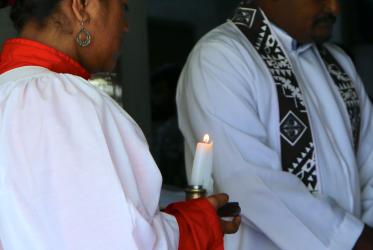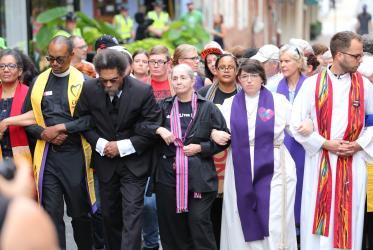Letter to H.E. Branko Crvenkovski, President of the Republic of Macedonia, 31 August,
2005
Your Excellency,
I write on behalf of the World Council of Churches, a fellowship of 347 churches
around the world including churches of the Orthodox communion.
The right to religious freedom is foremost amongst the most historic and fundamental
rights of human beings. Since its inception, the issues of church and
state and religious liberty have been of primary concern for the Council and its
member churches. The Council has also endeavoured to promote as one of its
objectives the prayerful search for forgiveness and reconciliation in a spirit of
mutual accountability, the development of deeper relationships through theological
dialogue, and the sharing of human, spiritual and material resources amongst
its member churches.
The World Council of Churches is therefore deeply concerned by the decision
of the Appellate Court of Bitola in the Former Yugoslavian Republic of Macedonia
that has sentenced to a term of imprisonment Archbishop Jovan of the Archdioceses
of Ochrid, the Canonical Representative of the Serbian Orthodox Patriarchate in
the country. The Council considers the sentence to be unduly harsh and severe for
a church dignitary of his age. It is likely to further embitter church and state relations.
Article 18 of the Universal Declaration of Human Rights, to which the
Council is committed, guarantees the right to freedom of thought, conscience
and religion and the right to manifest one's religion or belief in teaching, practice,
worship and observance. While passing the judgement the Appellate Court
should have given due thought and consideration to the universally accepted
norms and standards as laid down under Article 18 of the Universal Declaration
of Human Rights. It is pertinent to note that the countries of Europe have enshrined
these universal principles of religious liberty in their constitutions, setting a high
standard for promotion and protection of religious freedom and liberty. In the
circumstances, the decision of the Appellate Court is likely to cast a shadow of
doubt on the independence of the judiciary of the Former Yugoslavian Republic
of Macedonia in the region.
The World Council of Churches is of the considered view that inter-church disagreements
and disputes should only be resolved through a judicial approach as
a last resort. Such disputes and disagreements should be resolved through discussion
and dialogue.
The Council appeals to Your Excellency to intervene in this rather sensitive
matter and exercise Presidential discretionary powers to set aside the term of
imprisonment of Archbishop Jovan in the larger interest of church-state relationships
and to maintain religious harmony.
Yours sincerely,
Peter Weiderud
Director




